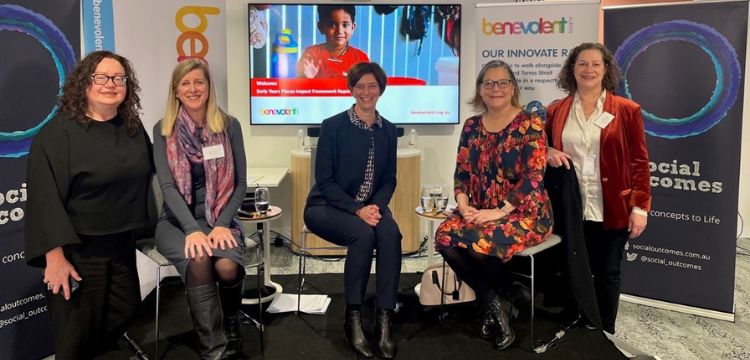The Benevolent Society, one of Australia’s first charities, and leading impact organisation, Social Outcomes, have launched an Impact Report with its new national Early Years Impact Measurement Framework which measures the long-term social and economic value of early childhood integrated support services for disadvantaged families.
Research shows the lifetime impacts of social disadvantage and developmental delay in the early years can extend into unemployment, teenage pregnancy, poor physical and mental health and involvement in crime. Practice-led evidence is needed to inform decision-making at community and systems levels to help future-proof Australians from these problems. But measuring the social and economic value that integrated childhood systems generate in Australia is challenging due to the varied experiences of families and the complex systems required to meet their needs.
While ample research suggests integrated early years service systems should better engage disadvantaged families, surprisingly, there is little evidence demonstrating they work in practise.
The Benevolent Society has risen to the challenge of filling this significant evidentiary gap by working with Social Outcomes to develop a framework that focuses on the outcomes which matter most in terms of social impact for vulnerable families and economic impact for the community more broadly.
Felicia Dingle, Director of Operations, Child Youth and Family Services Qld, at The Benevolent Society, said the new framework would be a foundational template for developing future impact measurement practices and learnings for governments and the sector more comprehensively. The goal is to demonstrate that there can be significant economic and societal upside when scaled.
“Without this evidence, there is no robust funding blueprint or cost-benefit analysis to help ensure the best investment decisions are being made to support disadvantaged families in our country, who are the least likely to access the support services available.”
The Benevolent Society has already used the framework to assess its Early Years Places (EYPs) impact and success in Queensland. The research findings have been released in a 2022 Early Years Place
Impact Report and provide preliminary indications of the potential social and economic impact of the EYPs, especially in early childhood development and child safety.
The EYPs are the state’s largest integrated early childhood support providers and have assisted disadvantaged families for more than 13 years. The EYPs service more than 4,400 young children and
their families per year. More than 9% are Aboriginal, and Torres Strait Islander families and 33% are from Culturally and Linguistically Diverse (CALD) backgrounds.*
Social Outcomes Founder and Managing Director Sandy Blackburn said that while this initial framework is a step forward to measuring and qualifying the positive impact of an integrated early childhood support service, significant work still needs to be done.
“To create a rigorous model that measures the far-reaching impacts of an integrated early childhood support system for children and families experiencing disadvantage, other organisations will need to be involved. Only then can we develop a ground-breaking and deep evidence-based service design that informs investment decisions and improves the lives of these families.”
The Benevolent Society calls on governments, philanthropists, and organisations to partner and/or invest in phase two of this process to develop this framework further and coordinate the ongoing collection of longitudinal data sufficient to support a robust cost-benefit analysis of integrated early childhood support. Only then can the national footprint of providers and policymakers understand the true social and economic value of quality, integrated services.
ciety launches new report on value of early childhood integrated support for disadvantaged families












